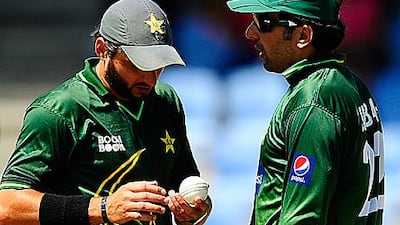Few topics could ever hope to supplant cricket in the consciousness of most Pakistanis. The death of the world's most wanted terrorist evidently is one of them.
Events in the political sphere have dominated all headlines and discussion in Pakistan in the past two weeks.
Cricketing controversies nevertheless continue unabated; for once, though, these controversies do not dominate the national discourse.
Captaincy squabbles, player and management disputes, team politics, batting collapses galore; throw in a betting scandal or two and we have the complete set. It is reassuring, in a macabre way, that at least when it comes to cricket, things are pretty much the same as they always have been in Pakistan.
The latest episode in the soap opera that is the Pakistan cricket team unfolded last week when Shahid Afridi, the one-day international (ODI) and T20 captain, returned home at the completion of the limited overs leg of the ongoing West Indies tour.
Rumours were rife in Pakistani media for some time about a potentially serious falling out between Afridi and the coach, Waqar Younis. The team's lacklustre performance in the last two ODIs and Afridi's own often disinterested and uninspired leadership and on-field presence provided ample grist to the ever-active rumour-mill.
The reports of a rift were confirmed by Afridi in his characteristically blunt manner immediately on his return, and then the media wars began, with sources close to the Pakistan captain alleging that his opinions in matters of team selection and strategy were persistently ignored by Waqar, team manager Intikhab Alam and vice-captain Misbah-ul-Haq.
The Pakistan Cricket Board (PCB), for once, chose the wise option and did not send around a plethora of needless "show-cause" notices. Instead, the PCB met with Afridi to discuss his inopportune comments, and has sensibly reserved judgement on the whole sorry saga till Waqar has returned to Pakistan and given his account of events, too.
This did not stop the feverish rumour-mongering, with unnamed "sources" claiming that Afridi had been sacked and replaced by Misbah. That may indeed happen but, thankfully, for once the PCB has not jumped the gun and been forced into untimely and ill-thought-out decisions.
It is difficult to see how both Afridi and Waqar can continue in their respective roles without a severe loss of face for both parties. Despite the politics inherent in subcontinental cricket, such a very public falling out between the two most senior team members is nevertheless quite rare in Pakistan. One has to look to England for the closest parallel.
The last great falling out between an international cricket captain and his coach was over two years ago when the then England captain, Kevin Pietersen, and the coach, Peter Moores, had a very public spat. The parallels to the Pakistan situation are obvious; an attention-seeking and media-loving captain, not renowned for his grey matter but with hordes of excitable fans, didn't appreciate being overruled in selection matters by a dour, professional but overbearing coach.
In the England scenario, once the rift became public, both captain and coach were almost immediately relieved of their responsibilities by the England & Wales Cricket Board.
That has obviously not happened in Pakistan. Here, matters are somewhat complicated by the fact that Afridi is not Pakistan's captain in what is still considered the premier form of the game, namely Test cricket - where an altogether different character, the thoughtful, intelligent and preternaturally calm Misbah has been able to form, apparently, a much closer bond with Waqar.
The current Guyana Test notwithstanding, Waqar and Misbah have fared reasonably well in the Test arena, both working professionally and sensibly, and hence the PCB is loathe to relieve Waqar just yet. Will sacking Afridi and replacing him with Misbah for ODIs then be the easiest option for the PCB? Perhaps. But it won't be popular given the millions of Afridi fanatics not just in Pakistan but all over the world.
In time, though, the PCB may just have to bite the bullet and follow England's lead. Waqar's public squabbles have made his position almost untenable and, given current Pakistani woes, the team would be better off with a specialist batsman as the coach.
England's fortunes improved remarkably when they replaced the two squabbling incumbents with a well-educated, "boring" but impressively focused captain in Andrew Strauss, and a tactically astute and apolitical foreign coach in Andy Flower.
The PCB would be well-advised to do likewise.
In the meantime, no one emerges with credit from this episode. Not Afridi, not Waqar and certainly not the PCB, presiding over the whole sorry mess.
Given all of this, Pakistan could have done without the latest bout of controversy, namely the news that Akram Raza, a former player, has been arrested on charges of placing illegal bets on Indian Premier League (IPL) matches. Of late, various former players from the subcontinent, including leading Sri Lankans, have spoken out about "a culture of illegal betting" being all-pervasive in this part of the world.
Raza was fined almost a decade ago by an inquiry into match-fixing, so this is not his first involvement in controversy. While there is no indication that any fixing was involved in the current IPL-related arrest, this does, once again, bring to the fore this most contentious of issues.
The more things change, the more they stay the same.

